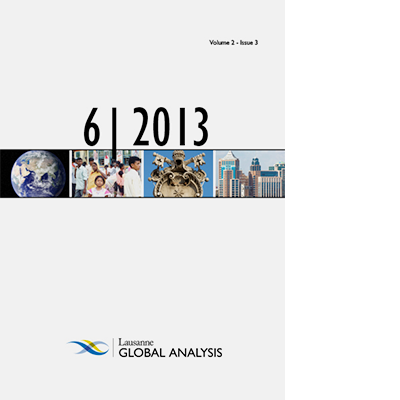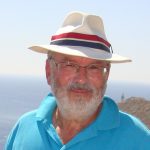Welcome to the June issue of Lausanne Global Analysis.
This is an expanded edition focused on themes and topics of current interest, many of which will be discussed this month at The Lausanne Movement leadership meeting. Additionally we have included two articles by Latin American evangelical leaders reflecting on the implications of the recent election of Pope Francis, and our regular contribution from researcher Peter Brierley.
A prominent theme at the Lausanne leadership meeting will be the global context in which we expect to operate over the next decades, how we should respond to it – and indeed how we can shape it.
Futurist Patrick Dixon offers seven dimensions – Fast, Urban, Tribal, Universal, Radical, Ethical, and Spiritual – which he says will shape our global future and then outlines the opportunities they present. He sees the future of mission in terms of ‘people movements’ and encourages us to pray for a new generation of missional people movements which will take the Gospel to every land.
Sas Conradie, Lausanne/WEA Global Generosity Network, reviews reports by the U.S. National Intelligence Council and the European Strategy and Policy Analysis System and unpacks the implications of the report findings for evangelicals. He concludes that Christians are already engaged in addressing many issues highlighted by the reports – such as migration, urbanization, and poverty. Sas says The Cape Town Commitment, produced out of The Third Lausanne Congress on World Evangelization, has emerged as an excellent road map for Christian engagement in the 21st century and that more should be done to get it accepted as such by the wider Body of Christ.
Todd Johnson and Gina Bellofatto, Center for the Study of Global Christianity, summarize the main findings of a 2013 update to the Atlas of Global Christianity. They emphasize that Christians today find themselves in very different contexts than 40 years ago and they note that fundamental shifts in the demographics of global Christianity are continuing. In fact in 1970, 41.3% of all Christians were from Africa, Asia, or Latin America. By 2020, this figure is expected to be 64.7%. They add that Christianity is expected to grow faster than any other religion in Asia between now and 2020. Todd and Gina conclude that Christians in both the North and South will need to be better equipped to interact with people from other religious backgrounds, and to address social concerns locally and globally in the future.
Mac Pier, The New York City Leadership Center, reflects on the rapid and startling growth of cities around the world and the implications for mission. He sees God’s hand at work in urbanization, bringing the nations to within walking distance of Christians in urban centres, but is concerned that the Christian mission of the Church is not keeping up with these changes. In his article, Mac proposes some action steps Christians can take to be more strategic about impacting global cities with the gospel.
William Messenger, Theology of Work Project, Inc., analyses the increasingly prominent topic of workplace ministry in the global Church and highlights the opportunities that the workplace affords both for evangelism and for transformation. He suggests that The Lausanne Movement can encourage workplace ministry by influencing churches to affirm the workplace as mission and equip their congregations to be agents of God’s kingdom in, at, and through their work. William concludes that the workplace may be the Holy Spirit’s greatest arena of evangelism and discipleship in the 21st century and asks if God is calling Lausanne to leadership in this area.
Norberto Saracco, former Lausanne International Deputy Director for Latin America, recalls his positive interaction over the past decade in Argentina with Archbishop Jorge Mario Bergoglio, the newly elected Pope Francis. He highlights what he’s learned from his contact with Pope Francis and concludes that God is calling Christians to work in unity to preach the Gospel, live the Gospel, live out God’s love and take up a lifestyle that honours the Gospel. Norberto also encourages evangelicals to pray for Pope Francis, as the Pope himself has often asked.
Young Brazilian evangelical leader Ludmila Ghil points out that Pope Francis has said he wants to engage in dialogue with evangelicals and others and that it is already clear that Brazil, the largest Catholic nation in the world, will be a major focus of his attention. She challenges evangelical leaders there to respond positively in view of The Cape Town Commitment’s call to partner in unity in missions and sees a need to overcome the history of difficult relationships between evangelicals and Catholics. Ludmila sees joint action between the groups with regard to theology and poverty issues and mission which could result in transformation in Brazil and a transformational model for the global church.
Finally we conclude with an article from Peter Brierley, Lausanne Senior Associate for Church Research, on “generational” transmission of the gospel. Peter explains that often parents overlook the important role they play in pointing their children to Christ and concludes that, “As Archbishop Carey said in 1999, ‘the church is always one generation away from extinction.'”
Whether you are planning to read the full articles or just the executive summaries, we hope that you find this issue stimulating and useful in your personal and ministry/organization life.
Please send any questions and comments to analysis@lausanne.org. The next issue of Lausanne Global Analysis will be released in September.

